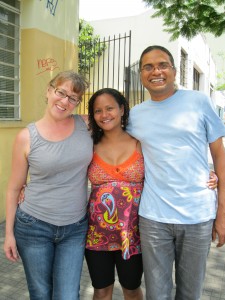“I can be happy with some of the things that I have achieved recently but I am not going to fool myself as well. I know that my happy ending is not to be found in this life. There are many challenges ahead of me. I have many battles to face and I know that I have to face them alone because they waged in my soul. It is good to know that I can know person of Jesus in this life and I don’t have to wait until the next life to see Him. He has been my comfort and counsellor and the strength that is going to help me go beyond my limitations.”- Janaina Prado
Janaina recently posted this on Facebook. Her post reveals the loneliness of her life journey but it is not a loneliness that leads to desperation and hopelessness. She has already walked this path before. Her loneliness is now leading her to the path of solitude; a path of self-discovery.
I remember one specific conversation I had with Janaina about 17 years ago. She was 14 then. She told me about the time she was almost adopted. She was living in an orphanage when a couple from Germany wanted to adopt her. According to Brazilian law, they had to fly to Brazil to meet her before the process was finalized. It was love at first sight for the woman. Janaina said that the feeling was mutual. However, she was not ready to leave her brothers behind. Nothing could convince her to agree with the adoption. Even though she was only eight at that time, the Brazilian law respected the sentiments of the child in the adoption process. Consequently, the family gave up on the process. They could not bear to separate the young girl from her siblings. However, the woman adopted Janaina as her daughter in her heart and never lost contact with her. Unfortunately, her brothers left the orphanage leaving Janaina behind. She eventually ran away and ended up in the streets. Her life in the streets led to drug addiction and her condition went from bad to worse. In her conversation with me, she said that she regretted not leaving with the family to Germany. She imagined her life would have been better if she had taken the bold step and agreed with the adoption. Most people would agree with her. If her story was a fairy tale, we would say that she lived happily ever after in Germany with her kind adopted parents. The people who wanted to adopt her were kind and good people. However, this does not mean that her life would have been a bed of roses in Germany.
We will never know if her life would have been better in Germany. It would have been different. She would have been financially better off and perhaps have a middle class lifestyle. Maybe she might have gone to college and even have a well-paying job. Maybe she might not have learned to overcome the loneliness and discover her solitude with God. Maybe she would never discover the strength to overcome the battles waged in her soul.
Aristotle said that the chief aim of life is live a complete and fulfilled life. According to him, virtues guide us in this path of self-discovery. Material goods and even a comfortable life do not bring us closer to discover this fulfilled life. In many cases, they could be an obstacle. What we define as a happy ending may not necessarily mean the person is on the path of self-discovery. In the conventional sense, it just usually means that they are living a comfortable middle-class lifestyle. However, life has more to offer than this. Janaina is on the path of discovering this and she realizes that she does not need a happy ending to do it.
The joy of her journey is to know for sure that she has everything she needs to live a complete and fulfilled life. She also knows that her life does not just end here but the time here is just part of the journey. Her close and real relationship with Jesus is the answer to help her engage and overcome the inner battles waged in her soul. She knows that she cannot do it by herself and only the strength that comes from the person of Jesus is going to help her. This is not knowledge that has been passed onto her. Her post on Facebook comes from a personal self-discovery. No pastor could have articulated it so perfectly as she did. She wrote this out of her own personal experience.
Someone once asked me what do we consider as a success in our ministry. I would point to Janaina. I would love for the children and teens we know today in the streets to one day discover what Janaina wrote on her Facebook. For us, this would be success. We don’t need a happy ending. We desire that the children and teens discover together with us the path to a fulfilled life.


